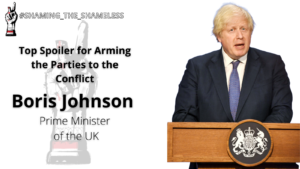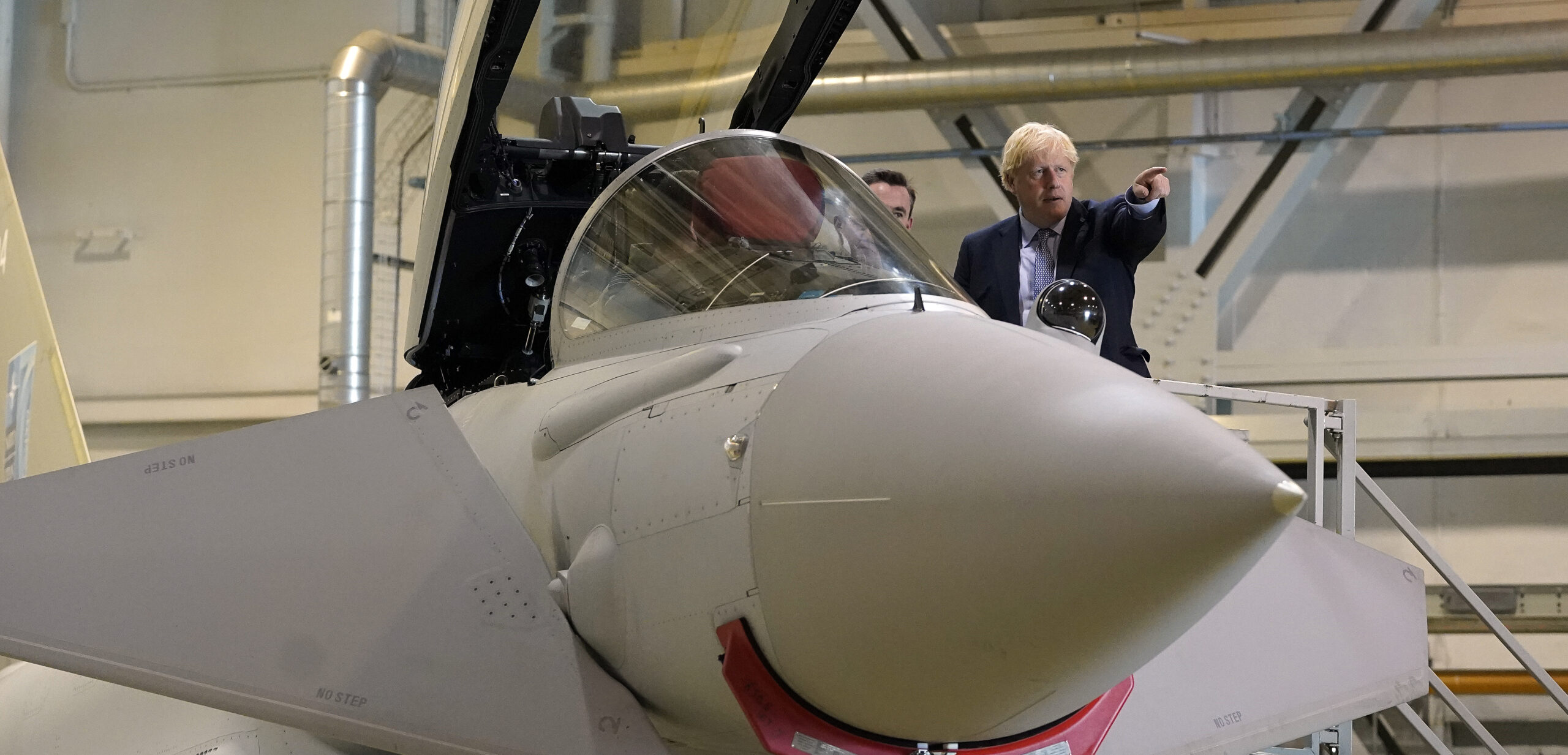
Yemeni and international civil society have submitted nominations for Yemen’s top “Spoilers of Peace” across ten human rights-related categories. CAAT have nominated Boris Johnson on behalf of the UK government, under Category 7, ‘Top Spoiler for Arming the Parties to the Conflict’. This nomination aims to recognise the UK’s role as one of the leading suppliers of arms to Saudi Arabia during its involvement in war in Yemen. You can read extracts from our nomination below.
An esteemed panel of judges – activist Alice Mogwe, researcher Hadil Al-Mowafak, human rights defender Huda Al-Sarari, and human rights lawyer Reed Brody – will select the best and worst across each of these catergories. The announcement will be made at The Spoilers of Peace Awards 2021: Yemen on Tuesday 2nd November 2021. #Shaming_the_shameless
CAAT’s nomination: Boris Johnson
BREAKING: Boris Johnson was awarded the prize for “Top Spoiler for Arming the Parties to the Conflict” by the panel of judges! The award ceremony can be viewed here.
Why is this person a spoiler for this category?
CAAT nominates Boris Johnson on behalf of the UK government, in recognition of the UK’s role as one of the leading suppliers of arms to Saudi Arabia during its involvement in the war in Yemen, and to a lesser, but still significant, extent to the United Arab Emirates and other members of the Saudi-led Coalition.
Moreover, the nomination reflects the extent to which the UK Government has gone over and above the call of duty in defending and promoting arms exports to Saudi Arabia and its allies. While other major suppliers, in particular the US, have made some moves to limit such arms sales, the UK government has shown unrivalled tenacity in maintaining arms supplies of all types in the face of strong political and legal challenges.
Notably, Boris Johnson was the incumbent at the time of the government’s decision to resume the issuing of arms export licences to Saudi Arabia and its allies in July 2020. This followed a court-mandated temporary halt to licencing and review of licencing decisions, resulting from the Court of Appeal’s ruling in June 2019 that the government’s previous approach to such decisions was “irrational and therefore unlawful”.
Arguably, this review presented the clearest possible occasion for the UK government to change course in the light of its legal obligations and the hard facts of the war in Yemen. That the government, led by Boris Johnson, chose instead to persist in its policy of supplying arms and to defend this policy against further legal challenges, heightens Johnson’s responsibility for the policy, and his status as a “spoiler of peace”.
What specific actions did they take? When/where did they take these actions?
Saudi Arabia is by far the UK’s biggest arms export customer. Major UK arms deliveries to Saudi Arabia since the start of the Saudi intervention in Yemen, and relevant to the Saudi war, include:
- 24 Typhoon block-20 Fighter/Ground attack aircraft, delivered between 2015 and 2017.
- Ongoing maintenance, services and support for the Royal Saudi Air Force’s UK-supplied Tornado and Typhoon Fighter/Ground attack aircraft, provided by the UK MOD and BAE Systems. This is a continuous operation as part of two long-term defence agreements between the UK and Saudi Arabia: the Saudi British Defence Cooperation Program (for the Tornados) and the Al Salam program (for the Typhoons).
- Precision-guided bombs and air-to-surface missiles, including Paveway IV guided bombs, Brimstone missiles, and Storm Shadow Missiles, throughout the duration of the conflict to date. SIPRI estimates that 100 Storm Shadow air-to-surface missiles, 1,000 Brimstone missiles, and 2,400 Paveway guided bombs were delivered between 2016 and 2020, but precise numbers are not available.
Specific export licences for the delivery of Typhoon combat aircraft to Saudi Arabia, since the start of the Saudi-led war, were issued on 14 May 2015, 27 February 2017, and 6 February 2019. The second of these, a licence for £266.4 million, was issued during Johnson’s tenure as Foreign Secretary.
Licences for bombs, air-to-surface missiles, and their components, have been licenced on a regular basis. Some particular licences of note, during Johnson’s tenure as Prime Minister, include two licences for “components for bombs”, worth a combined £698 million, issued on 4 August 2020, and a licence for “air-to-surface missiles” worth £100 million, issued on 6 August 2020.
The full quantity and value of UK arms exports to Saudi Arabia is unknown, as the UK does not provide data on the value of arms export deliveries, and as many exports are conducted through open licences whose financial value is potentially unlimited. Based on BAE Systems annual reports and on licence data, CAAT conservatively estimates total UK arms sales to Saudi Arabia since the beginning of the intervention, at £20.6 billion.
Forensic Architecture’s interactive Yemen Timemap includes information on Coalition airstrikes up to August 2019, and government and corporate actions and decisions up to 2021. The map can be filtered to show incidents specifically linked to the UK government and corporations, and weapons systems.
Describe the human, social, or political impact resulting from their actions, and how it has undermined prospects for Yemen’s peace and postwar recovery.
The key human, social and political impacts resulting from the UK’s commitment to exporting arms to Saudi Arabia at any cost has been twofold. Firstly violations of International Humanitarian Law (IHL) by the Coalition have continued with impunity, throughout the conflict in Yemen. As early as 2015 there were numerous reports detailing breaches of IHL by reputable bodies including the United Nations Panel of Experts, Médecins Sans Frontières, Human Rights Watch and Amnesty International.
8,780 civilians have been killed by Coalition air raids since the bombings began, according to the Yemen Data project. UK aircraft, produced, supported, and maintained by the UK arms industry in partnership with the UK government, comprise a little over half the Saudi fleet of strike aircraft. These aircraft are equipped with UK-supplied munitions as described above. On some occasions, remnants of UK munitions have been found at the site of Coalition airstrikes on civilian targets.
The UK continued not only to supply arms but to fight any accountability for these violations in its own courts, and in doing so emboldened Saudi Arabia to continue violations of IHL, firm in the knowledge that there would be no consequences at a bilateral or international level. Such legal and rhetorical strategies only confirm Saudi Arabia’s sense of impunity. We are seeing the impact of this impunity grow, as Saudi Arabia recently lobbied the Human Rights Council successfully to end the mandate of the UN Group of Eminent Experts on Yemen. The Group was the only international mechanism to investigate violations of all parties to the conflict in Yemen.
Secondly, the UK’s over-reliance on Saudi Arabia as the biggest customer for UK arms exports has greatly diminished the diplomatic role the UK could have played in bringing an end to the conflict. As well as holding a permanent seat on the UN Security Council, the UK is also ‘penholder’ Yemen. However, the degree to which the UK has entrenched itself as a party in the war, and fought accountability for violations of IHL by the Coalition and its own complicity in perpetrating these violations, has erased any illusion that the UK could be an objective third party in peace negotiations.

